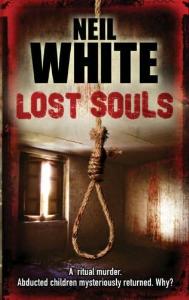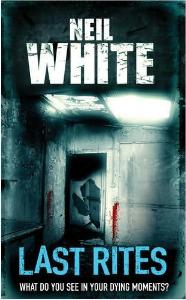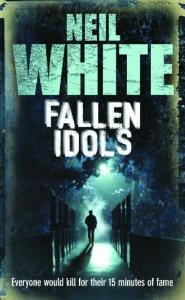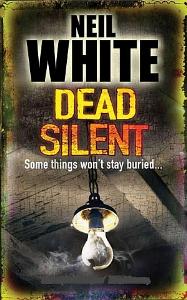Born
above a shoe shop in the mid-1960's, Neil White spent most of his
childhood in
Wakefield in West Yorkshire as his father pursued a career in the shoe
trade.
This took Neil to Bridlington in his teens, where he failed all his
exams and
discovered that doing nothing soon turns into long-term unemployment.
Re-inventing himself, Neil returned to education in his 20's, qualified
as a
solicitor when he was 30, and now spends his days in the courtroom and
his
evenings writing crime fiction. With the publication of his latest
book, Dead Silent (Harper Collins),
SHOTS
sent Laura Harman to interrogate him.
Hi, Neil.
Without meaning to
begin in too obvious a place, how much of yourself do you find that you
put
into your characters? You have said that Jack is you, if you had more
courage –
do you wish you could be more involved in crimes the way he is?
 From the start, I've always
thought of Jack Garrett as like me but less laid-back; there is lots of
me in
there. If there is a given situation, the thought process of how the
character
deals with the situation is a mix of what I think that character would
do and
how I would react if I was there and was more ballsy. The problem with
basing
it too much on myself that any piece of misfortune could well be dealt
with by
a shrug and a "them's the breaks" response.
From the start, I've always
thought of Jack Garrett as like me but less laid-back; there is lots of
me in
there. If there is a given situation, the thought process of how the
character
deals with the situation is a mix of what I think that character would
do and
how I would react if I was there and was more ballsy. The problem with
basing
it too much on myself that any piece of misfortune could well be dealt
with by
a shrug and a "them's the breaks" response.
In terms of being involved in crimes, I did
want to be a police officer at one point in my life, but I realised
that I was
too squeamish; I would struggle to deal with a bad road crash or a
drunk being
sick. It would be fun to get more hands-on though. I still work as a CPS
solicitor three days a week, but that is very clean and detached,
although I do
enjoy a good old bad-tempered courtroom spat now and again. The problem
I have
is that I'm a bit of a role-player, in that when I get my suit and tie
on and
go to work, I turn into someone I perhaps don't recognise, with a
different
social outlook, all about getting the bad guys. Once I get home and put
on the
scruffs, I turn back into genial old Neil again.
However, I have often thought
that if I stopped being a prosecutor, I would like to be a store
detective or
private detective, or anything really that involved lots of skulking
around and
finished off with a bit of a fight.
You came into
this career after
deciding to return to school. Do you feel more qualified to ponder upon
contemporary social problems, having experienced some of them yourself?
That's a tough one, because it's
hard to know whether I like gritty stuff because I've got a working
class
background, or I just happen to like gritty stuff. As a child, I used
to enjoy
crime programmes on television, and my father, the Johnny Cash
obsessive, was
always playing music that told gritty stories of prison life and
poverty, and none
of that was because I was on a council estate in Wakefield. It was
just what I liked and he liked (my father's father was a colliery
deputy-manager, and so had a relatively affluent upbringing, in a
large,
detached Coal Board house).
Also, the council estate I grew
up on never felt grim. Most people worked back then, there was never a
sense
that crime or drugs had a hold, and as there were not as many material
possessions in the seventies, the only real differences between
communities
were things like driveways and whether the television was black and
white or
colour.
 The dole years in the eighties
were tough spiritually, and I remember what it feels like to not just
have
nothing, but also to feel that having nothing is about as good as life
is ever
going to get, but I think I was saved by youth, because as good as it
can be to
have nice things, I had some great times with friends that had little
to do
with money or status.
The dole years in the eighties
were tough spiritually, and I remember what it feels like to not just
have
nothing, but also to feel that having nothing is about as good as life
is ever
going to get, but I think I was saved by youth, because as good as it
can be to
have nice things, I had some great times with friends that had little
to do
with money or status.
The main thing I take from my
own experience is that it is all more complicated than it seems. I know
there
was never a risk of me being involved in crime, but that is more to do
with
fear of the consequences than any moral standpoint. The one thing I do
regret
is that I ended up with a chip on my shoulder, and although I like to
think
that I've shrugged it off, I am still more comfortable in a working
men’s club
than a nice restaurant. The irony is that I have learnt more about real
social
problems, like the depths of alcoholism and drug misuse that people
fall into,
through being a criminal lawyer, because I come across people who live
lives
like nothing from my own personal experience.
So I don't necessarily feel more
qualified, as I'm not sure I've "lived the life", but it doesn't feel
unfamiliar, which must help.
There is a good deal of human
interest in Dead Silent. It almost seems as though
this is as important
as the crime aspect. Would you say that anthropology is a key part of
crime and
law?
People commit crimes, and
different things drive people to act like they do. What interests me
most about
crime is what is going on in people's heads. I am always intrigued when
I see
someone in court who has done something you wouldn't expect to happen
with
their background, and so I want to know what's going through their
heads. I remember
conducting a case of a woman charged with murder, where I was the
lawyer doing
the initial hearing, and as she was brought up from the dock she
blinked at the
lights and had a general look of disbelief mixed in with fear, and I
wished I
could have sat down with her and really found out what was going
through her
mind. That's what fascinates me about crime.
But crime comes from all sectors
of society and for a whole host of reasons, and sometimes it is too
easy to
generalise about "criminals". Some people do lead criminal
lifestyles, have decided that it is the best way to provide for
themselves,
whereas others sometimes fall into it through a mix of circumstance and
bad
luck. It is always a tricky area, because in one sense poverty creates
crime, because
poverty stifles opportunities, but equally people who choose crime are
always
going to be poor, except for those who get really good at it, and the
line that
divides those who offend by choice or circumstance is too blurred to
really see
it properly.
 Do you find
it hard to write
about the harsher realities of crime, or do you find that you have
become
hardened to it, for example when Laura is in peril?
Do you find
it hard to write
about the harsher realities of crime, or do you find that you have
become
hardened to it, for example when Laura is in peril?
I want to be affected by the
harsher realities of it, and that's why I like crime fiction. I want to
feel
the horror, the squeamishness, the blood, because ultimately it isn't
real, and
so I can enjoy it knowing that no one was really hurt. If I was too
hardened by
it, I don't think I would enjoy writing it, as I wouldn't enjoy reading
it. The
best example I can think of is the film Marathon Man
with Dustin
Hoffman, which involves a scene where Dustin Hoffman is "examined" by
a former death camp dentist. When the dentist finds a cavity, he rams
the metal
instrument hard into it, and it's one of those shut your eyes and
squeal
moments. The point of this example is that if you ask anyone if they
have seen
the film, they will always say "oh, is that one with the teeth", and
shudder or grimace. As a writer, I accept that my book will occupy
someone's
mind for a very short time, and the gaps will be filled by life and
books
written by other people, and so if I can ever write a book that makes
someone
go "oh, is that the book with the …" and shudder, then I
will feel
that my work is done.
Many crime heroes have their
little idiosyncrasies, whether it be a certain Belgian arrogance or a
more
earthy alcohol dependency. Jack, however, is an incredibly real
character. Did
you intentionally shy away from creating a more caricatured man?
Yes, I did. I've never been a
big fan of heroes who are incredibly heroic. I've always preferred the
ordinary
hero in an incredible situation. The danger with idiosyncrasies is that
they
can appear contrived and distracting, and only really work if they are
part of
the story. The best contemporary series characters, like Mark
Billingham's
Thorne or Rankin's Rebus, allow the idiosyncrasies to develop as the
story of
the character develops, so it is part of the character's story, rather
than
have them shoe-horned them in to make the character interesting.
Do
you ever find yourself
surprised by where your stories take you? Or do you know from the off
the exact
path you will be walking?
A bit of both really. When I
start out, I know what the story is about and how it ends, along with
some
major plot points. Joining everything together sometimes involves a
rethink, as
I realise that getting from one part of a story to another doesn't work
with my
original idea, or I might think of something better as I'm writing it.
So often
the story isn't exactly how I perceived at the start, but has the same
basic
core.
On
your website you note a
childhood love of the Famous Five. Do you think that such books can
still offer
something to the adult author (and reader) in terms of inspiration and
joy?
Just the memory of seeing a
mystery unfold in a way that is exciting and sometimes a little scary.
The best
thing about them is that the mysteries were solved by ordinary
children, not
the police or super sleuths. Okay, really posh and privileged children
who had
uncles who lived on strange islands, but the premise is the same, and
when you
are ten, you see the mystery, the excitement, not the class divide.
Are you tempted to use cases
you've been involved in as a basis for a story? Or do you try not to
use things
that might just be too real?
I don't use cases I have come
across as the basis for a story, as it just wouldn't be right. What I
do use
though are the little asides or comments you pick up on, like the slang
of the
police or comments by witnesses. What I do take from my prosecuting is
the
comfort that it is hard to be too extreme, if it can be described as a
comfort,
because real crime provides more grim realities than any writer could
think up.
Do
you enjoy the contrast
between the beautiful rolling landscape of the book and the viciousness
of the
acts committed there?
I do find middle class crime
interesting. I have dealt with a few fraud cases involving outwardly
respectable people, and it has become clear, when I have trawled
through their
bank and credit card statements, that everything was always going to
come
crashing down around them, and I have been intrigued as to how they
could live
normal lives, go to sleep, kiss the kids goodnight, smile for the
camera, with
all of that going on in the background. What goes on behind the
respectable
curtains is often more interesting than what goes on in the everyday
struggles
in the grimmer parts of town. As much as I enjoy a "grim up north"
tale, the countryside and the warmth are as much a part of the map as
the
terraced streets and derelict mills.
Finally, you
recently tweeted
that Patrick is your favourite character from Spongebob
Squarepants. Can
this really be true? I would say mine is definitely Squidward.
 Patrick is by far the best
character. Preferring Squidward is like saying that you prefer Mr Burns
to
Homer Simpson. I can't believe I've been challenged on that point.
Patrick is by far the best
character. Preferring Squidward is like saying that you prefer Mr Burns
to
Homer Simpson. I can't believe I've been challenged on that point.
Visit
Neil’s website neilwhite.net
Bibliography
1. Fallen
Idols (2007)
2. Lost Souls
(2008)
3. Last Rites
(2009)
4. Dead
Silent (2010)
|


